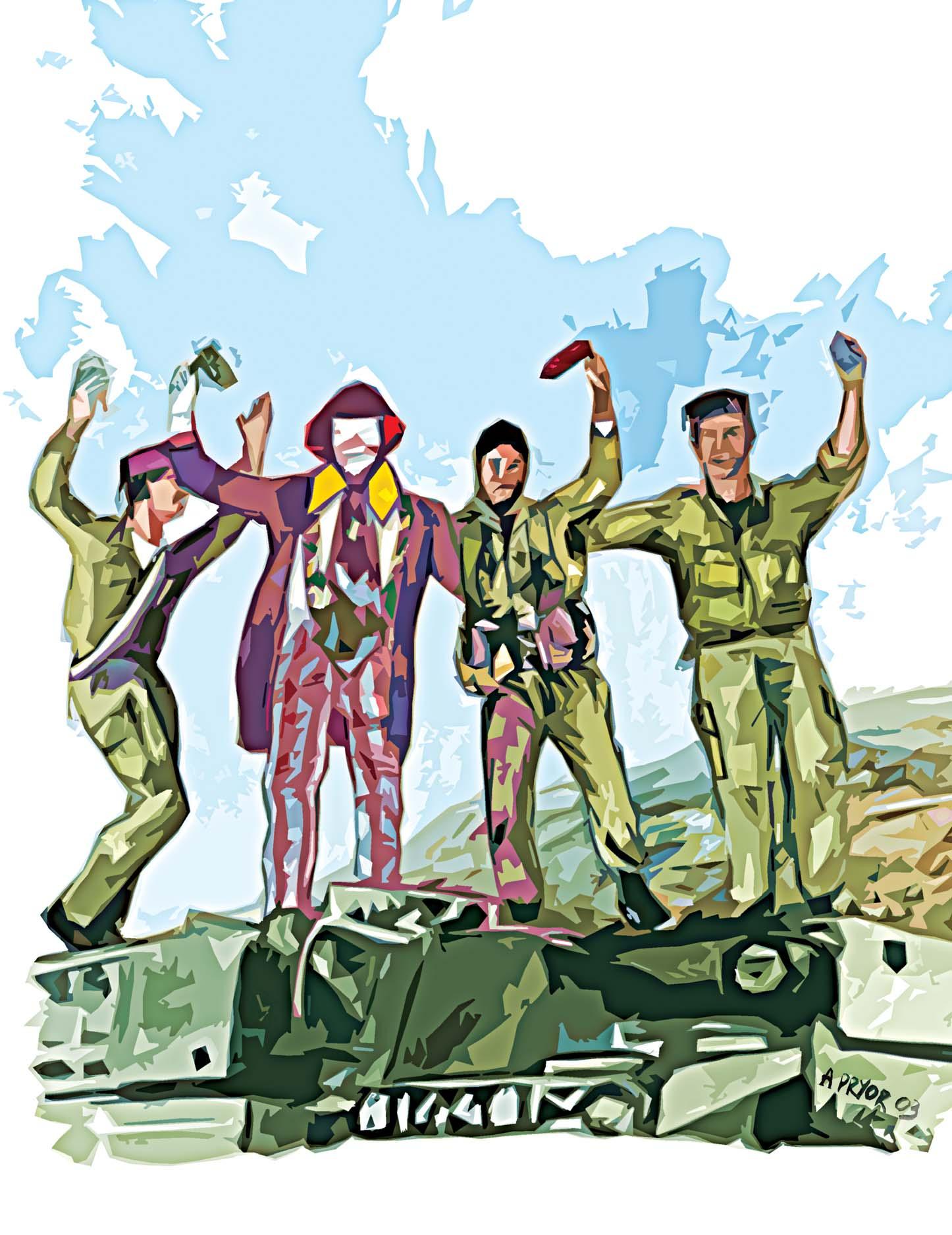
CertifiedSoulNutrition Adar5764/Winter2004 GlobalAudience:ONEMILLION www.KosherSpirit.com
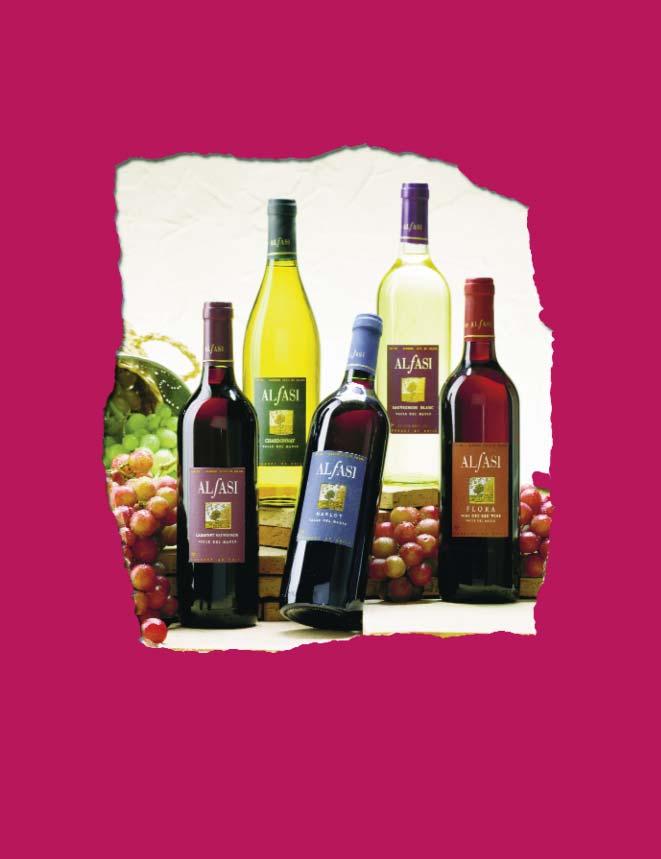

Grown in the breezy climate of the Maule Valley, Alfasi is produced at one of Chile‘s finest vineyards. So, if your love for exceptional wine brings you to the vineyards of Chile, or at least the Chilean section of your favorite wine shop, make sure you bring home a bottle of Alfasi. Cabernet Sauvignon • Chardonnay • Flora • Merlot • Sauvignon Blanc Special Reserve Cabernet Sauvignon • Special Reserve Merlot SELECTED AND IMPORTED BY ROYAL WINE CORP. • NEW YORK, NY, U.S.A. Superb wines worthy of international acclaim K P Visit our website at www.royalwines.com
Can we ask you a few questions?
Take a chance.
What was the most moving moment in your life?
I hope you don’t mind if I tell you that I think that’s a ridiculous question. In life, there are thousands of moving moments. How does a person recall every moving moment? Who could tell which moving moment is the most moving moment? Do you sit around with a ruler, judging: “This was more moving than the other most moving moment?”
Are Jews and gentiles really so different?
You sneeze in front of a gentile, they wish you the best. In front of a Jew: “Oh, did you see a doctor?” And if you tell them, “I’m all right”—they say, “No, the way you sneezed—didn’t look all right to me. If I were you, I’d look into it.” You can change the subject and talk about catching Saddam Hussein; an hour later they’re still up to it: “Don’t forget what I told you. I didn’t like the sound of that sneeze. You never know—a cold will lead to pneumonia; pneumonia will lead to lumbago. I read in the paper about two Jews who passed away from salmonella.” I think it has a lot to do with the whole history of persecution. Jews are always worried about their survival and protecting each other from forces that they can’t predict or explain.
Do you enjoy what you do?
You’ll hear of an electrician quitting because he’s tired, a basketball player quitting because he can’t move anymore, a dancer quitting because he’s sweating too much, but I never heard of a performer who’s making a decent living, quitting. The egomania is there as long as you live. It’s like you never hear of a politician quitting. Everybody else is 65, they retire. A politician...is first getting started. At 95, they’re still running some country.
Speaking of elderly politicians, did Shimon Peres invite you to his 80th birthday bash?
Shimon Peres is not too crazy about me. Two years ago I wrote a column on why I consider Arafat a fake, so he wrote me a letter pleading with me to realize that Yasser Arafat is our only hope.
Do you think people still believe that Arafat is our only hope?
I don’t think there are too many Jews waiting for Yasser Arafat to be the leader of a peace movement. When the President of the United States said Arafat is not a peace partner, it became obvious to every gentile in the world, and the Jews couldn’t delude themselves anymore. Wouldn’t it be ironic if somebody is standing over your head with an ax, and you’re the only person who believes it’s a flower pot?
Would having a Jewish President be a blessing or a curse for American Jewry?
I don’t think it will affect the Jews one way or another. It all depends on how effective he is as a President. When Lieberman was running for President, the only people who were talking about him being a Jew were the Jews. You didn’t hear the goyim even mention that he’s Jewish, because they’re past that stage.
What is your opinion of President Bush?
I respect his sense of purpose and dedication to fighting terrorism. Ariel Sharon told me personally that, in his opinion, the best President for the State of Israel, since its birth, is Bush. [Sharon] says, you don’t know how much [Bush is] on our side because he is so hounded by world opposition to his policies.
What is the source of the greatness of the Jewish people?
It’s in G-d’s Torah, it’s all in the Torah: values of scholarship, of study, of learning, of giving, of caring, of sharing, of helping, of doing as much for others as yourself, of doing more for others than for yourself, of bringing nothing but love and peace on this earth.
What is the Jewish people’s greatest contribution to the world? Me!
Subscribe: 877.OK.SPIRIT or www.KosherSpirit.com
Advertise: 917.912.3684
Feedback: editor@kosherspirit.com
EDITOR-IN-CHIEF: Dovi Scheiner
ASSOCIATE EDITOR: Sara Levy
KOSHER EDITOR: Rabbi Chaim Zalman Levy
EDITORIAL CONSULTANTS: Neria Cohen, Shalom Doron, Malka Percal
COVER ART: Angela Pryor, www.apryordegarat.com

DESIGN: www.spotlightdesign.com
NOTE: The views of Kosher Spirit are not necessarilythoseofthe ~.
~ Kosher| 3
By Michael R. Bloomberg
Purim is a holiday filled with traditions that center on family and community—whether it’s baking and eating hamentashen, exchanging gifts of food with our neighbors, dressing in costumes, or reading the Megillah. But it is also an ageless story of perseverance, faith, and strength. It celebrates the victory of Esther and Mordechai over an evil opponent who wanted to eradicate the Jews. It reminds us of the strength that comes with unity and faith. That’s a timeless message—and also a timely one, both for the people of Israel in the wake of recent terrorist attacks, and for the people of New York as we continue to rebuild our great city.
This past summer, the world once again saw the ruthless face of terrorism. Anywhere that terror strikes—in the Middle East or in the streets of Lower Manhattan—it’s an assault on all free people. That is one reason why I traveled to Jerusalem in August, along with Rabbi Haskel Lookstein, Brooklyn Councilmember Simcha Felder, and former Mayor Ed Koch. We visited the Western Wall and then boarded the No. 2 Egged bus to ride a route that had been a recent target of terrorism. We lit candles at the site of the bombing on Shmuel Hanavi Street, to honor the memories of the 21 people who were killed in the attack, and spoke with the rescue workers who had acted so courageously. We met with the injured at Hadassah University Medical Center; one terror victim whom we visited was just one month old. Afterwards, we walked the streets of Jerusalem and demonstrated that the people of the City of New York stand united with the people of Israel.
Although the recent attacks took place halfway around the world, they brought loss and grief to many of our neighbors in New York City. As a city that has been struck by terrorists, we share the anguish and the outrage of our neighbors, and our hearts go out to those who lost loved ones in the attacks. After the attack on the World Trade Center, offers of help and expressions of support poured into New York City from people around the world. That meant more to us than we can ever say, and we’ll never forget those who stood by us. Now, in the face of these barbaric crimes, it’s our duty to show solidarity, demonstrate our humanity, and proclaim our resolve to stop terrorism everywhere.
And so, while Purim is one of the jolliest of Jewish holidays, we cannot forget the people across the globe who have suffered from terrorism. Our hearts, once filled with sympathy for the struggle of our ally Israel, today well with empathy, as we face a common enemy. The special kinship New Yorkers feel with Israel is stronger now than ever. Like Israelis, we are members of a free society; we cherish our liberties. No matter what the terrorists do to shake our will, we will never let them win.
 MichaelR.BloombergistheMayorofNewYorkCity.
MichaelR.BloombergistheMayorofNewYorkCity.
4| ~.org
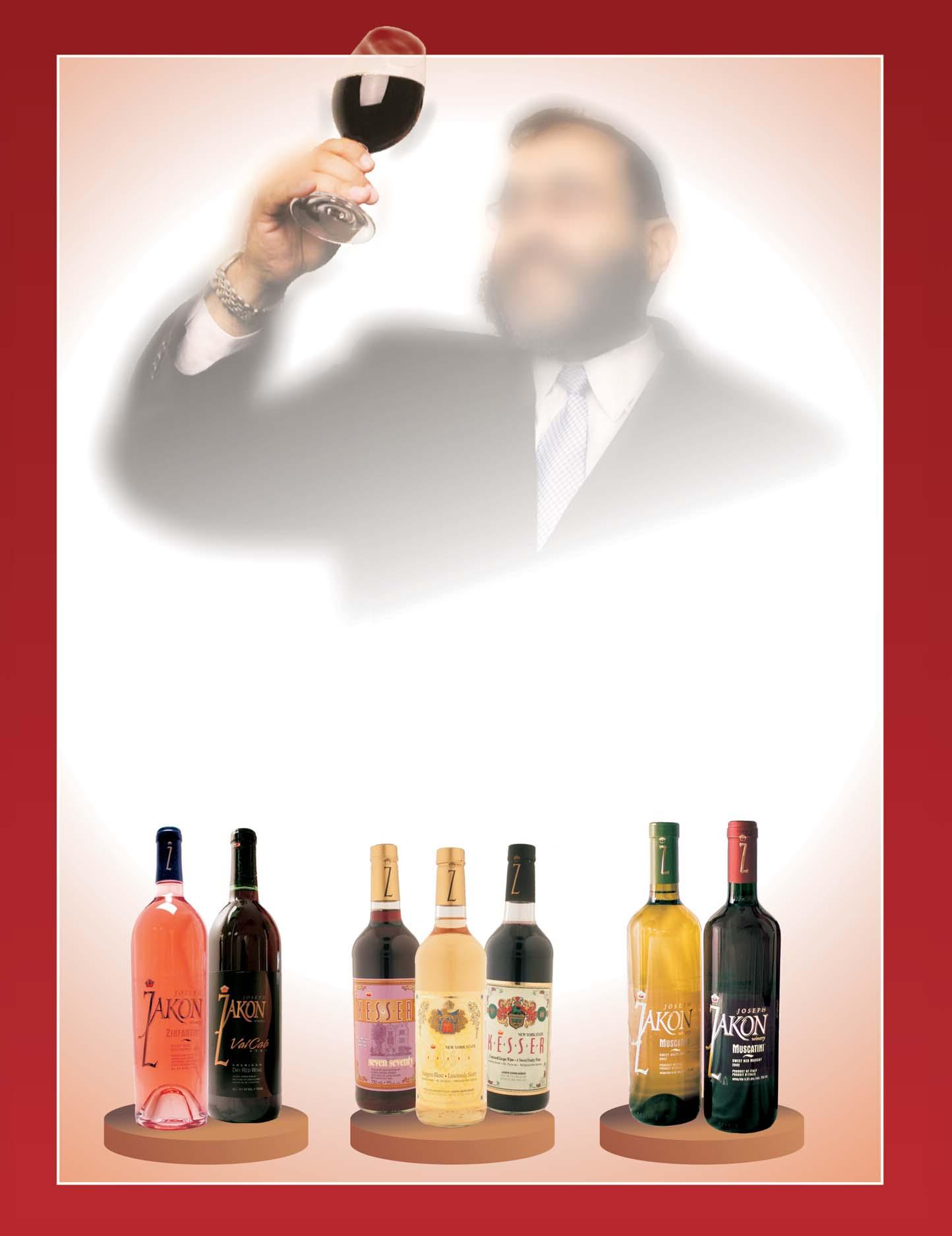
Millions of Americans are embracing the dietary laws. Okay, maybe not the same dietary laws found in the Bible, but the eating habits of the whole country have changed almost overnight. Forget Pepsi, we’re the No-Carb Generation. Stick to the meat part of meat-and-potatoes, and you’re golden. Have steak every day, even for breakfast if you’re so inclined, and America’s most popular diet promises you’ll live close to the proverbial 120. Dr. Atkins spread the gospel: Thou shalt not eat carbs.
Beef prices have skyrocketed, so that non-Jewish consumers are starting to pay the kind of money for meat that used to distinguish kosher food. This is the Wimpy Age—Popeye’s friend Wimpy, that is—the meat-crazed mooch who famously offered to “pay you Tuesday for a hamburger today.”
Vegetarians, obviously, aren’t very happy with this trend. (A clever ad for one prominent chain of steakhouses used to boast, “Horrifying Vegetarians Since 19__.”) Many vegetarians believe that it is a sin to take an animal’s life in order to lengthen our own. All of G-d’s creatures, they contend, have the same right to live out their years. A noble thought, ethically motivated, and yet—supremely un-Jewish!

Jews do eat meat. In fact, the Talmud teaches, that’s what transforms an ordinary meal into a Sabbath or holiday feast. Simchah, true joy, can be attained only with bassarv’yayin, meat and wine. Animals, says the Midrash, were created before Adam so that they would be available for his table, just as a king prepares food in advance for his most favored guest.
But before you tear into that rib-eye, there’s something else you should know. Judaism agrees with the meat of the vegetarian argument: Life, whether human or animal, shouldn’t be taken lightly; we don’t have the right to kill other life forms simply because we have the power to do so.
Perhaps the most profound dietary law is one that’s relatively unknown. In fact, if it were put into practice it’s quite conceivable that a lot of us would no longer know the delight of devouring a steak or polishing off a couple of burgers. You see, Judaism doesn’t really give us carte blanche to kill animals for food. It allows us to eat meat only on one condition: that the animal whose life is taken serves to feed someone whose life has more meaning than simple bestial existence.
High Steaks
“Am ha’aretz assur le’echol bassar.” A boor, whose life is devoid of Torah, is forbidden to eat meat! That’s the Talmud’s conclusion based on a simple equation: For any life ended to support another, there must be a qualitative difference between the life that is taken and the life that will be sustained. Animals live, as Sigmund Freud put it, to get and to beget. They eat and they procreate. They simply exist. Human beings are meant to strive for more. Our years are supposed to be imbued with a spiritual quest for holiness. Life is not merely getting and begetting, but being and becoming. Created in the image of G-d, we have an obligation to imitate our Divine Maker. It is only our efforts in pursuit of this goal that permit us to turn animal flesh into the food that fuels us.
This adds a whole new dimension to the Atkins Diet. Piling on meat may keep you thin—but it might be a sin. It all depends on whether you deserve the meat. So here’s the new diet plan that gives equal weight (no pun intended) to both your body’s need to be slim and your soul’s longing for spiritual fulfillment: Live your life with the constant awareness that you are meant to be much more than an animal, and in that way you’ll earn the right to enjoy as many prime cuts of meat as your heart desires.
RabbiBenjaminBlechisaninternationallyrecognizededucatorandreligiousleader,andistheauthor of If Life Is Good, Why Is The World So Bad?, as well aseightotherbest-sellers.Hewasrecentlyranked#16 inalistingofthe50MostInfluentialJewsinAmerica.
By Rabbi Benjamin Blech
This is the Wimpy Age—Popeye’s friend Wimpy, that is— the meat-crazed mooch who famously offered to “pay you Tuesday for a hamburger today.”
6| ~.org

18 oz. prepared kosher steak: $22 8 issues of Kosher Spirit: $14 SUBSCRIBE TODAY ℡ (Toll Free) 877.OK.SPIRIT : www.KosherSpirit.com Select issues of Kosher Spirit areinsertedinchoicenewspapersonarotationalbasis. Toensurethatyoureceiveallissuessubscribenow. Kosher Spirit Steak $22 $14 COST/SATISFACTION
he factory manager called to say his plant needed to be made kosher; his company had a kosher order that needed processing right away. He set the date for the first intermediary day of Sukkot: a time when urgent work is allowed by Jewish Law but is still filled with the spirit of the holiday and colored by the ongoing mitzvahs of eating all meals outdoors in the sukkah and saying the blessing on the lulav and esrog. It was a beautiful autumn day.
The food-processing plant is tucked into one of the small towns that punctuate rural Ohio’s flow of fields and woods. It’s a long drive from home through the fall landscape. After 90 minutes, I emerge from the car’s sunlit bubble and enter the plant. Already, the jacketed tanks are steaming and the pipes hissing. The factory manager has gone out on an errand. When he comes back, we’ll be ready to go, sending boiling water coursing through all the plumbing. Then the kosher product can safely follow.
By Rabbi Dr. Shmuel Klatzkin

POWER
PLANT
Nothing remarkable has gone on; it’s only a quiet day’s work. But for all the ordinariness, it’s still holy work. Holiness can scream and shout, but it doesn’t have to. Today, it just smiles and points—here, far from any Jewish community, a factory is processing food ingredients that are kosher. It’s good business for the owner, but something else is going on.
Though he doesn’t really grasp the mechanics, the factory owner sees a confluence of good business and things good for the soul. He’s happy that the manager and I will make the good business happen. The manager, too, appreciates both the practical and the spiritual. He does all in his power to accommodate my needs, both as a kosher supervisor and as a Jew who needs to converse a little with G-d.
Holiness can scream and shout, but it doesn’t have to. Today, it just smiles and points— here, far from any Jewish community, a factory is processing food ingredients that are kosher.
Something’s different today: The plant's owner has stopped by, along with his teenage son. I’ve never met them before. The owner steps forward to shake my hand. “I guess you’re going to bless the equipment now, right?” he says, smiling.
Returning his smile, I say: “I’m here to make sure the job gets done right.” I invite him to follow and learn the process of kosherizing his plant, but he excuses himself, explaining that he has planned a full afternoon with his son. The owner respects things spiritual, happy to think of blessings on his equipment. Had there not been a demand for kosher product, he probably wouldn’t have hired us, but that’s not important. He’s content to leave the details of this blessed work to
his manager and me.
The plant manager knows exactly what is required. For years, he has helped rabbis make his plant kosher; he knows I didn’t come to say prayers over his equipment or sprinkle the pipes with holy water. He knows his machinery must be down for 24 hours before I come. He knows the water must be at a rolling boil. And he announces each stepto me as he pulls the handles that send the water through the system. He beckons to me to lightly touch the water-filled pipes and feel their new heat.
He knows also to bring me to a quiet corner after the work is done, where I won’t be interrupted during the afternoon prayers.
And in the end, some Jews I’ll likely never know will eat the food processed here; its spark of energy will give them strength to serve G-d. Someone will trust that care was taken that this food should be kosher—fit to power the good work of a life.
The individual pieces of what we have done are ordinary, but their sum is remarkable. Through the lens of this mitzvah of keeping kosher, the everyday working world shows itself an astonishing place. Human purposes interweave, supporting each other. One person invests trust in another, one person empowers another, energy and purpose are shared. Apparent opposites—workday and holiday, Jew and non-Jew, the business of food and its spirituality— resolve into a singular whole, a holiness real enough to taste.
RabbiDr.ShmuelKlatzkinisakoshersupervisor with ~ Kosher Certification.
8| ~.org
T
was asked to write an article entitled “Purim Without Koby.” But I can’t write about Purim without Koby because even though Koby is dead, I don’t celebrate Purim, or anything else, without Koby.
In an article in The New York Times, Steven Flatow said that even though his daughter Aliza was killed by terrorists, he was still her parent. I am still Koby’s mother. I will never not be his mother.
Trying to explain my relationship with Koby is like trying to translate blindness to a sighted person. I speak a different language now.
It is like being a haunted house, or a hallowed one. There are times when I feel horrible pain, and I feel that I will always be haunted. I see how people look at me sometimes and remember the haunted house I used to pass on my way into town when I was a kid. Unlike our modern, shingled house, it was old, dark brick with spires and round windows. Now perhaps, I would look at the house as curious, interesting, maybe even beautiful. For what is haunted can also be hallowed, sanctified by loss into something grander, more attached to G-d. It depends on how you translate your experience.
Purim tells us that this world is one where meaning is hidden. The name Esther, the heroine of the Purim story, is related to the Hebrew world for hiddenness. And in the Purim Megillah, Gd is never mentioned by name, though he is not absent from the story.
To encounter G-d, we have to move from our position of pride to a position of humility, enhancing our own hiddenness. Only then can we emulate Esther, who could have stayed in the palace, where she lived in luxury, massaged and oiled and groomed, but chose instead to feel the suffering of the people. Esther did not let her elevated status go to her head.
That may be our job in this world: to connect more with other people, to feel their pain and their problems, to act as one with them. Perhaps that is what we should celebrate: our ability to help each other move toward healing; to move from our limited sense of self to feeling one with the people around us. Such unity can lead to healing.
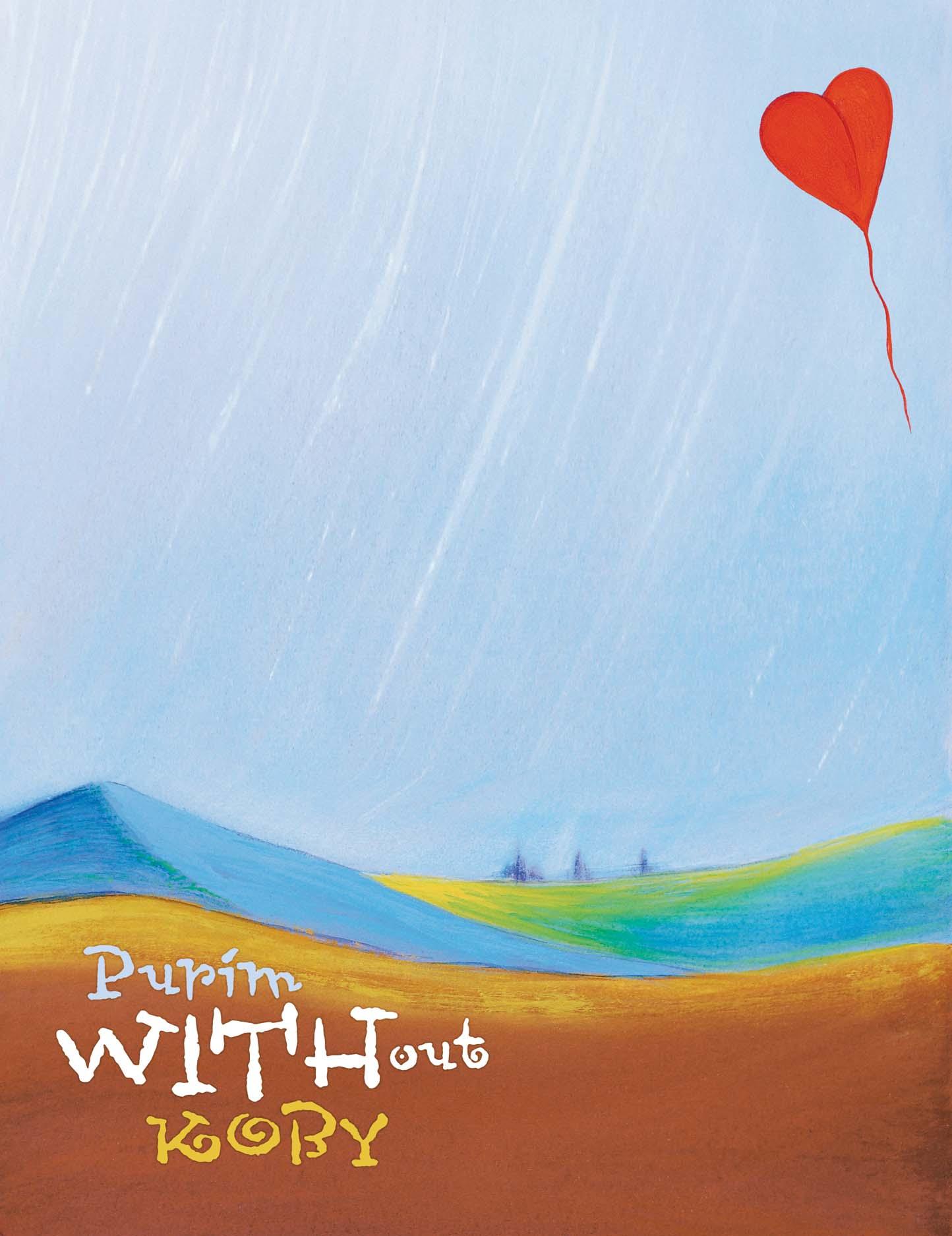
Less than a year after our son was killed, my husband and I marked our wedding anniversary by going out to dinner. I
can’t say we celebrated, because we were too sad. When we walked into the restaurant, the smiling waitress with her shiny, black hair had a spirit and effervescence I could only admire. I thought to myself, ”She has no idea of the pain I am living with, the weight of what I carry.”
As my husband and I ate our meal, we realized that the restaurant was a perfect place to commemorate what would be Koby’s upcoming fifteenth birthday. We wanted to take fifteen poor or disadvantaged people out to dinner to mark Koby’s birthday—to remember the dead by bringing joy to the living.
We spoke to the manager about our plans. He said that he volunteered at a nearby center that helped teens from poor, broken families, and he thought that the teenagers would appreciate going out with us. The idea was taking form almost on its own. We hadn’t thought about taking teenagers out for a meal, but it made sense. Koby was a teen when he was killed. We thanked the manager for his suggestion. Before he walked away, my husband said: “Do you know the Goodman family? They live around here. They lost their 16-year-old son, Tani, this year in an accident—we went to the shiva—and I wanted to know how they are doing.”
“You can ask them yourself. Your waitress is their daughter.”
I looked at her, at her beauty and her spirit, and I thought, “You never know what’s going on inside a person.” I had misjudged her. When she came over to the table, we told her of our loss, and she shared her own.
As we spoke, I realized how much of life is hidden. We don’t see what’s inside of people.
As we shared our feelings, my husband and I felt less isolated. The pain lifted for a moment. Healing may occur when we reveal what’s hidden inside of us. Then the pain doesn’t haunt us but brings us closer to others.
If we can’t even see what’s inside of other people, imagine how difficult it is to see G-d in the world. But Purim tells us that even when we can’t see G-d, he is with us. Even when it seems otherwise, G-d does not abandon us in our pain.
On May 8, 2001, Koby Mandell, age 13 and the eldest son of Sherri and Seth Mandell, was murdered by terrorists. His body was found in a cave in the rocky countryside that surrounds the Mandell home in Tekoa, Israel.
~ Kosher| 9
Sherri Mandell is the author of The Blessing of a Broken Heart (TobyPress, 2003)anddirectorofwomen’shealingprogramsfortheKobyMandell Foundation.
Maxwell House® invites you to cook up a storm this Passover…
Passover: Passover celebrates the Jewish people’s emancipation from slavery during Pharaoh’s rule in Egypt. Every year, Jewish families pay tribute to their history by joining together for a Passover dinner called a “seder.” Prior to the seder, Jewish homes are spotlessly cleaned. All bread, and any other leavened food, is discarded. This act acknowledges the time when Jews, given a brief window of opportunity by Pharaoh, made bread for the exodus but couldn’t wait for it to rise.
Passover 2004/5764: Monday, April 5—Tuesday, April 13
Passover Cheesecake with Strawberry Sauce

2 cups soft coconut macaroon cookie crumbs
(Kosher for Passover)
3 Tbsp. margarine, melted
4 pkg. (8 oz. each) PHILADELPHIA Cream Cheese, softened
1 cup plus 1 tsp.sugar, divided
2 Tbsp. grated orange peel
4 eggs
2 cups fresh strawberries, hulled and quartered
2 tsp. orange juice
MIX cookie crumbs and margarine. Press onto bottom and 1 inch up the side of lightly greased 9-inch springform pan. Bake at 325°F for 12 minutes.
BEAT cream cheese and 1 cup sugar with electric mixer on medium speed until well blended. Blend in peel. Add eggs, 1 at a time, mixing just until blended after each addition. Pour over crust.
BAKE for 55 minutes or until center is almost set. Run k nife or metal spatula around rim of pan to loosen cake; cool before removing rim of pan. Refrigerate 4 hours or overnight. Combine strawberries, orange juice and remaining sugar. Serve with cheesecake. Garnish with chocolate decorations, if desired
Makes 16 servings.
Tip: Goes great with Almond Macaroon Coffee
1/2 cup ground MAXWELL HOUSE coffee
1/3 cup sugar
6 cups water
1/2 tsp. almond extract
PLACE coffee in filter in brew basket of coffee mak er. Place sugar in empty pot of coffeemaker. Add water to coffeemaker; brew. When brewing is complete, stir in almond extract. Makes 6 servings.
HOLIDAY
COOKING
NO PURCHASE NECESSARY. Sweepstakes open to U.S. residents, 18 years and older as of 2/23/04. Sweepstakes begins online on 2/23/04 and ends on 4/30/04. Limit 1 entry per email address/person/day. PRIZE/APPROXIMATE RETAIL VALUE: (1) GRAND PRIZE: $2,000 Scholarship (awarded in the form of a check)/$2,000. Odds of winning depend on number of entries received. Sweepstakes subject to additional restrictions contained in the Official Rules, available at www.kraftfoods.com/kosher. Void where prohibited. You could WIN a $2,000 Scholarship for Yeshiva, Seminary, or College Education. Go to www.kraftfoods.com/kosher to enter online!
Kraft says
LIFE” to education! Kraft Scholarship Sweepstakes
“TO

© 2003 KF Holdings. Makeeveryday Good to the Last Drop®
coffee as fresh as the morning. Packed at the peak of freshness, a special seal locks in flavor and aroma. It’s a fresh way to make every day Good to the Last ~P
Taste
NEW ~ CERTIFICATIONS
555 CAFE
New York, NY
Dairy Restaurant
600 LB GORILLAS
Wrentham, MA
Water
BROOKSIDE PRODUCTS
Maryport, England
Fish Products
BROSTE
Lyngby, Denmark
Aromatic Chemicals
CAFFE D’AMORE
Monrovia, CA
Flavoring Extracts
CAPUA
Campo Calabro, Italy
Essential Oils
DUNKIN DONUTS
Braintree, MA
Coffee
ECHO LAKE FARM
PRODUCE
Burlington, WI
Baking Supplies
EMERALD CATERING
Miami Beach, FL Caterer
EUROCOM
Angri, Italy
Canned Fruits & Vegetables
HEARTLAND HONEY
Kansas City, MO Honey & Molasses
HEBEI NEW DONGHUA
Shijiazhuang, China
Amino Acids
HORMEL FOODS
Austin, MN
Condiments
HUBEI YITAI PHARMACEUTICAL
Tianmen, China
Pharmaceuticals
INDEPENDENT MARKETING
Houston, TX
Cookies & Crackers
INTERCOM
Nivel, Guatemala
Chocolate Products
I.T.C. HOLLAND TRANSPORT
Reek, Holland
Trucking
J.A. KIRSCH
Teaneck, NJ
Canned Fruits & Vegetables
JANE’S BEST FOODS Minong, WI
Condiments
JT CAFE New York, NY
Dairy Restaurant
KING’S KOSHER PIZZA

Great Neck, NY Dairy Restaurant
OIL CHEM
Lincoln, RI
Oil Shortenings
OLD ORCHARD
BRANDS
Sparta, MI
Juices
OMYA PERALTA
Hamburg, Germany
Emulsifiers & Stabilizers
O’PELLE ENTERPRISES
Pompano Beach, FL
Baked Goods
PANFOODS
London, U.K.
Freeze Dried Coffee
PEARL VALLEY CHEESE

Fresno, OH
Dairy Products
PERFORMANCE FOOD GROUP
Richmond, VA
Dairy Products
POCAHONTAS FOODS
Richmond, VA
Dairy Products
POLIVA
Ramla, Israel
Oil & Shortenings
POWER SNACKS
Brooklyn, NY
Dried Fruits & Nuts
PREMIER
SPECIALTIES
Middlesex, NJ
SWISS VALLEY FARMS
Platteville, WI
Dairy Products
TALIA’S STEAK HOUSE
New York, NY
Meat Restaurant
TASTI D-LITE New York, NY
Syrups
TITTERINGTON’S
Woburn, MA Baked Goods
TO-JO FOOD PRODUCTS
Avondale, PA
Canned Fruits & Vegetables
TOTALLY TANKER INTERIORS
Tulare, CA
Truck Washing
TRADIN ORGANIC
Amsterdam, Netherlands
Baking Supplies
UBF FOODSOLUTIONS
S. Ana, CA
Condiments
AGRANO
Riegel, Germany
Yeast Extract
AKZO NOBEL CHEMICALS
Emmerich, Germany
Fatty Acids
ALBEMARLE CORPORATION
Tyrone, PA
Chemicals
ALBERT KEIJZER
Zaandam, Netherlands
Trucking
ANCIENT WAYS
Costa Mesa, CA
Health Foods
ATLAPAC TRADING
Commerce, CA
Canned Fruits & Vegetables
AURORA PRODUCTS
Bridgeport, CT
Dried Fruits & Nuts
AVALON COFFEE
Rio Grande, NJ
Coffee Products
BAGEL BITES
New York, NY
Dairy Restaurant
BAKER’S BRIGHT
Cincinnati, OH
Baking Supplies
BIOKYOWA
Cape Girardeau, MO
Amino Acids
BIOVET JOINT STOCK
Peshtera, Bulgaria
Enzymes
CAROLINA INGREDIENTS
Pineville, NC
Mixed Spices
CAROLINA SOY PRODUCTS
Warsaw, NC Oil & Shortenings
CESALPINIA FOOD
Bergamo, Italy
Coagulating Agents
CHICK-FIL-A
Atlanta, GA
Dried Fruits & Nuts
CONSERVAS VEGETALES
Guadiana, Spain
Tomato Products
CONSORZIO BIOITALIA
ALIMENTARE
Buccino, Italy
Pasta & Grains
CVS PHARMACY Woonsocket, RI
Candy
DANISCO GRASSE
Grasse Cedex, France
Flavoring Extracts
DANSHAR
Rosh Ha’ayin, Israel Popcorn
DEAN & DELUCA
New York, NY
Candy & Chocolate
DEB-EL FOODS
Elizabeth, NJ
Condiments
DUBAIR
Milwaukee, WI
Flavors
FASHION CRAFT Syosset, NY Candy & Chocolate
FLAVIA BEVERAGE SYSTEMS West Chester, PA Coffee

FUDE + SERRAHN Hamburg, Germany Dairy Products
LABORATOIRE MONIQUE REMY Grasse, France Flavoring Extracts
LE CHOCOLATE Spring Valley, NY
Candy & Chocolate
LES VINS MAYER HALPERN
Argentiere, France Wines
LIBERTY ORCHARDS
Cashmere, WA Candy & Chocolate
LUMEN FOODS
Lake Charles, LA Soy Snacks
MARAMOR CHOCOLATES Columbus, OH Candy & Chocolate
MISITANO & STRACUZZI
Messina, Italy
Essential Oils
MITSUI CHEMICALS
Omuta, Japan
Amino Acids
MYC INGREDIENTS
Oceanside, NY
Dehydrated Vegetables
Flavors
PRICE CHOPPER
Schenectady, NY
Water
PROGRESSIVE GROUP
Richmond, VA
Baking Supplies
P.T. BINA KARYA PRIMA
Jakarta, Indonesia
Glycerin
P.T. MUSIM MAS
North Sumatra, Indonesia
Fatty Acids & Glycerin
RHODIA FOOD - INDAL
Faro, Portugal
Emulsifiers & Stabilizers
RUN-A-TON GROUP
Morristown, NJ
Baking Supplies
RUSANOV CORPORATION
Fair Lawn, NJ
Baked Goods
SAFEWAY
W. Creek, CA
Juice & Juice Concentrates
SAK’S FIFTH AVENUE
New York, NY
Candies & Chocolate
UNIPRO FOODSERVICE
Atlanta, GA
Cookies & Crackers
VAN LOAN
Bayonne, NJ Spices
VITABLEND
Wolvega, Netherlands
Health Foods
WAL-MART CANADA
Ontario, Canada
Snack Foods
WCC HONEY MARKETING
City of Industry, CA
Honey
WILD OATS MARKETS
Boulder, CO
Water
WILTON INDUSTRIES
Woodridge, IL Baking Supplies
www.ok.org
GARRY NULL & ASSOCIATES
New York, NY
Chocolate
GLOBAL OUTSOURCING
Okeechobee, FL Juices
GREAT LAKES PACKAGING
Valparaiso, IN Popcorn
NELSON JAMESON
Marshfield, WI
Coagulating Agents
NEW HONG KONG NOODLE
San Francisco, CA
Pasta & Grains
NORTHEAST MARKETING
Lakeville, MA
Juice & Juice Concentrates

SHOWA DENKO
Kawasaki, Japan
Amino Acids
SLIM & SOFT BREAD
Miami, FL
Bread
SWEDISH OAT FIBER Varobacka, Sweden
Flavoring Extracts
101 ways ~ made keeping kosher easier in 2003
By Rabbi Don Yoel Levy
Today, more and more consumers are careful to look for a kosher symbol, such as the familiar ~ of ~ Kosher Certification, when they buy packaged foods. The mark of a reliable supervising agency is the consumer’s assurance that the product contains only kosher ingredients, processed according to the Torah’s standards. But what assures the agency that the product is kosher?
Kosher supervision is just what its name implies: overseeing a food product’s manufacture to make sure that both ingredients and processing conform to the kosher code. Once, food manufacture was simpler and more localized; the market for kosher products was smaller and more dependent on local companies than it is today. Back then, the supervising rabbi could research every ingredient himself and personally vouch for the kosher status of each component in the products that left the factory under his watchful eye.
Now, however, we live in an increasingly interconnected world. Major corporations and small manufacturers produce food products—raw foods, ingredients, flavorings, and food colorings as well as finished consumer goods—that are shipped across the globe. Today, you can walk into your local supermarket or specialty store and buy foods from all over the world; at the same time, the standard brand items on every shelf may contain ingredients produced a continent—or even a hemisphere—away from the plant that packaged the product. And a modern manufacturing facility may use dozens, hundreds, even thousands of distinct ingredients.
Obviously, the local supervising rabbi can no longer keep track independently of every component in the products under his supervision. Contemporary kosher supervision demands comprehensive, up-to-date knowledge from all over the world. For many years now, supervising agencies and rabbis have issued official letters of certification—Kosher Certificates—for each ingredient that is produced under their supervision.
Just as consumers rely on kosher symbols, the supervising agency relies on Kosher Certificates to verify the kosher status of the ingredients that are used in the factories they oversee. To grant kosher certification, we need certificates for any component whose status might be in question, for even one ingredient can render a product unkosher.
How do we verify that, with the passage of time, there has been no change in the kosher status of the thousands of ingredients found in a major food production plant? The standard practice is that Kosher Certificates are renewed once a year.
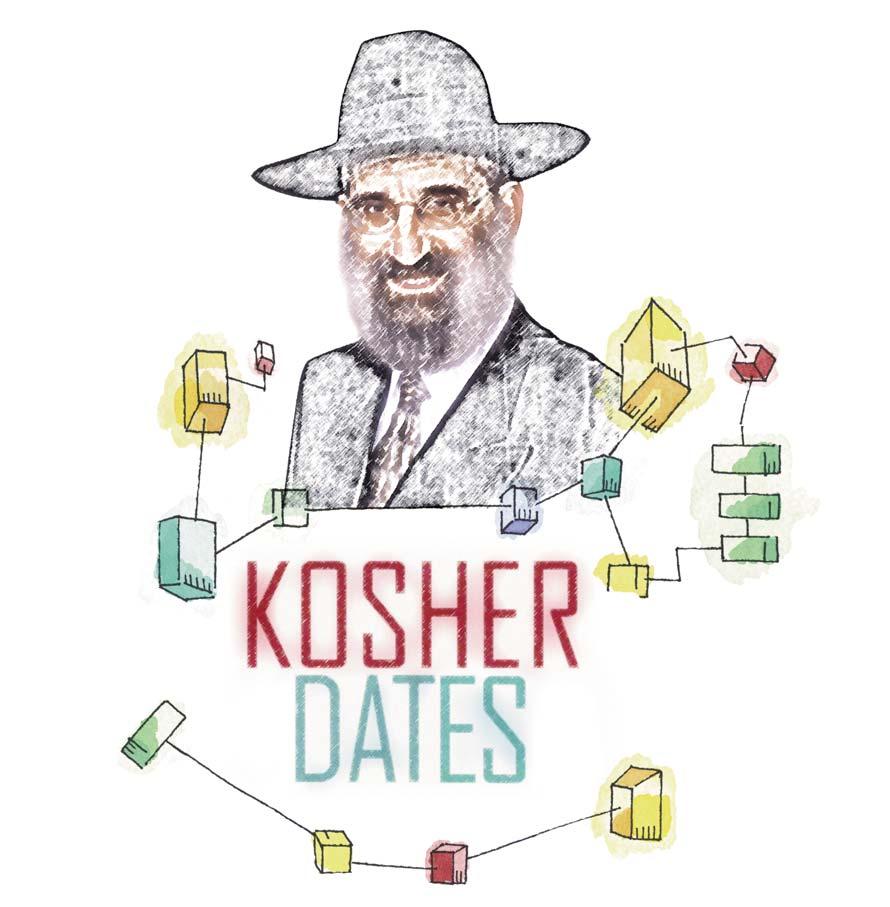
Certainly, this can be a taxing process: At the ~, for example, we demand that the producer collect up-to-date certificates for every one of its ingredients. In order to guarantee that products under our supervision are unequivocally kosher, we must have clear and current information on every component.
Difficult as this is, the ~ spares neither effort nor expense to ensure that our information is as accurate and up-todate as possible, at the same time easing the burden on our clients wherever we can. Our comprehensive computerized database cross-references all of the companies under our supervision, and we stagger our requests to allow one producer to benefit from the information submitted by another. Once we establish the current kosher standing of any ingredient, its status is updated throughout our system, saving everyone tremendous amounts of time, energy, and money.
At the ~, we are proud of the rigorous and efficient system we have developed to serve both client and consumer. Thankfully, many others join us in the immense task of spreading kosher supervision throughout the international food industry, but it seems that we are nearly alone in applying the strict standards that we work so hard to maintain. More than once we have discovered that other supervising agencies, perhaps afraid to burden their clients, have been lax in demanding annually updated certificates.
The details may be small, but the effects can be catastrophic: One missed ingredient, after all, can undermine the kosher status of a product used by thousands, even millions of consumers. In one recent example, we discovered that a well-known New York cheese producer—certified as Cholov Yisroel (dairy prepared under Jewish supervision) by two kosher agencies—for years used non-Cholov Yisroel starter cultures, while the certifiers remained unaware of the true status of the ingredient, as they never requested its updated certificate.
In our interconnected world, every agency is dependent on every other, and each one takes indirect responsibility for the others’ kosher standards. We do everything we can to catch the mistakes in other agencies’ supervision based on expired certificates. But for a body to be in optimal condition, every limb must be healthy; thus, we at the ~ appeal to all our colleagues to “get with the program” in shaping up the kosher industry to rely only on up-to-date Kosher Certificates.
~ Kosher| 13
RabbiDonYoelLevyisadministratorof ~ Kosher Certification.
Dear Helen,
You pose the question as a theoretical one: If you could be G-d what would you do? But according to Jewish thought this is not hypothetical; it is reality!
G-d has endowed each of us with a divine spark, a bit of Himself, which we usually refer to as “the soul.” This divine spark is our true identity; our body and the personality that comes with it are merely the vehicles through which our soul expresses itself.
Our bodies are human. But our souls are divine.
G-d made us in His image. From a spiritual perspective, we also have the divine powers of free choice, creation, and the direction of the entire world.
CHOICE. Really, only G-d can have free choice, because to have completely free choice you have to be above any influence that may sway you to choose one path or another. If I choose something due to peer pressure, ignorance, habit, or for intellectual or aesthetic reasons, I am not making a free choice.
G-d alone is above any influence. A human being is influenced by, among other things, environment, education, genetics, and mood. That means we aren’t truly free in our choices. In a purely physiological sense, we appear to be nothing more than complicated machines that will make predictable choices based on external and internal influences. From a spiritual perspective, however, we aren’t so one-dimensional. Our bit of the divine, our soul, is the core of our being, and that is above any influence. Our soul allows us to rise above our susceptible nature and be free to choose.
So, like G-d, we have free choice.
CREATION. In addition to our ability as human beings to invent, build, and reproduce, we are, in a sense, creators.
The Kabbalah teaches that our every action not only affects the world around us, but also creates new spiritual forces. When
Pop a Question with ARON MOSS
Dear Aron,
The movie “Bruce Almighty” is about a man who is given the job of being G-d for a week. It raises some questions: If you could be G-d for one week, what would you do?
Whom would you help? What punishments would you mete out?
I would like to hear your perspective on these questions.
we perform a virtuous act, we create a “good angel,” meaning a positive energy force. On the other hand, when we act selfishly or destructively, we create a “bad angel”—negative energy. Throughout our lives, we accumulate legions of these creatures that are our own creations. We each have an entourage of angels hovering around our souls.
These angels do not just flutter around aimlessly. Our good angels remain with us to protect us and give us strength. The bad angels haunt us and drag us down. Ultimately, the fate of these angels is in our hands. We can destroy the negative energy and even transform it to goodness if we regret the evil we have done and right the wrongs.
Like G-d, we are creators, and our creations are in our hands.
DIRECTION. The soul’s power is unlimited. An individual’s thoughts, words, and actions can move the entire world toward its ultimate purpose or delay the realization of that purpose. The Talmud teaches that one should imagine the world as precisely balanced between good and evil. My next move will determine which way the scales are tipped: Will I bring more corruption, pain, and sorrow into the world, or will I promote peace, happiness, and harmony?
So, just like G-d, we have free choice, we create and control our creations, and the destiny of the entire world is in our hands.
G-d could have created us otherwise. He didn’t have to give us such power. But He took a gamble, because He trusts us to do a good job.
So the question is not “What would you do if you were G-d?” but rather, “G-d has given you His power—what’s your next move?”
RabbiAronMossteachesKabbalahandrunsspiritualservicesinSydney, Australia.TopopaquestionorreceivehisQuestionoftheWeek, e-mail: rabbimoss@chinuch.com.au

14| ~.org
—Helen
By Rabbi Adin Even-Yisrael Steinsaltz
ABBALAH. The mere mention of the word conjures up images of magical and mysterious otherworldly dimensions, of spiritual secrets that are profoundly miraculous and deeply inspiring. Nowadays it seems everyone—Jew or non-Jew, famous or nameless—is discovering and uncovering the divine truths of Kabbalah. Or are they?
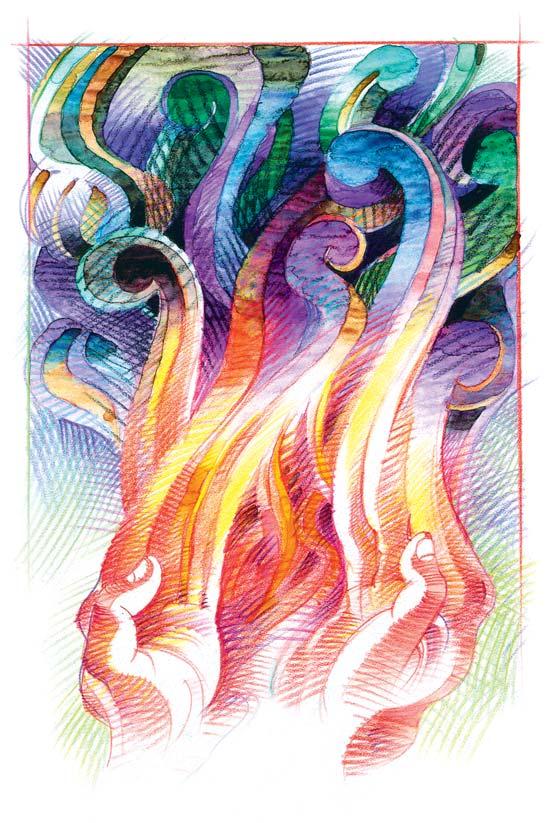
That question raises three, more pointed ones: What is the essence of Kabbalah? Will opening the exploration of Kabbalah to the masses demean and distort this extremely difficult and highly spiritual subject, reducing it to the level of pop culture? If Kabbalah is not appropriate for popular study, is it somehow still relevant to our lives?
Kabbalah literally means “receiving”; in Israel today, the receipt you get when making a purchase is called a kabbalah. The Bible, or Written Law, is given by G-d and is available to anyone who can read it. The Oral Law— which includes the Kabbalah—is received, passed directly from teacher to pupil.
Most of Torah is considered Torahhaniglet—revealed Torah, to be studied by all Jews. Kabbalah, however, was designated chochmah nisteret—hidden wisdom. In truth, Kabbalah was never literally hidden, but was not widely, or even publicly, studied.
The reason for restricting the study of Kabbalah relates to its subject matter. Kabbalah encompasses two general themes: ma’aseh bereishit—the theory or description of creation—and ma’aseh merkavah—Ezekiel’s description of the Heavenly Chariot, which teaches us about the relationship between humans and the Almighty.
is the language of Kabbalah. It is presented as a stream of abstract formulas, conveyed in Kabbalah’s own unique jargon, understood only by a select cadre of scholars trained to decipher it. To avoid misunderstanding, Kabbalah had to be taught one-on-one by a master teacher singularly attuned to the capabilities and receptivity of each student. One cannot simply open the classic Kabbalistic texts and glean their truths in a vacuum.
understand the whole map of Torah from beginning to end, the Hidden Law no less than the Revealed Law. Throughout history, there have been those who, very quietly, achieved extensive knowledge of the Hidden Law.
But today, most of us are simply incapable of comprehending Kabbalah. For us the question is, “Is there some way we, too, can ‘receive’ the remarkable teachings of Kabbalah in a meaningful way, without treading upon its divine essence?”
One answer lies in the Hasidic approach to Kabbalah.
It is a basic Kabbalistic concept that the human soul is, in a manner of speaking, a spark of Divine revelation within the world and that each human being is a microcosm of the entire universe. Hasidism shows how the rarified teachings of Kabbalah, which speak to the macro-universe, can be adapted into a structure with ethical and practical meaning for our individual lives.
e c v K
KKaballistic! aballistic!
When I discuss matters that are tangible and open for all to see and appreciate, things that are already “revealed,” it is simple for others to verify the truth of what I say. But if I am talking about angels, for example, I must be very careful. If I speculate from ignorance, what I say will be nonsense. And it may become dangerous nonsense if I fail to realize the power and meaning of what I am saying and end up defiling the Majesty of G-d.
Equally as esoteric as its subject matter
Unfortunately, today Kabbalah has been commercialized by those who pretend to grasp its innermost secrets. These pretenders purport to teach—and to sell—what they do not understand, to people who are not equipped to receive it. Kabbalah’s mystifying formulas become nothing more than intoxicating mantras to those who mindlessly repeat them. This is like trying to cure an illness by chanting the chemical formula of the remedy.
This is not to say that Kabbalah should not be studied and learned. In fact, it is incumbent upon Jewish scholars to
In this way, Hasidism is a form of applied Kabbalah. Just as the Revealed Law frames the behavior of our bodies, the internalization of Kabbalistic notions of the Hidden Law can attune us to our soul, educating it to connect with the Divine. In this model, the power of Kabbalah is harnessed not to serve our own desires but to align them with the wishes of the Almighty. One of the most important Hasidic books is called Zohar Chai, “the living Zohar.” That is what Hasidism does: It gives the Kabbalah life by translating it into something meaningful in one’s relationships with others and, most important, something that can quell the strife within one’s own soul and calm the struggle of one’s inner being.
Rabbi Adin Even-Yisrael Steinsaltz—an author, scholar, and social critic who is best known in the United States for his monumental translationofandcommentaryontheTalmud—isthe founderofaworldwidenetworkofJewisheducationalinstitutions.Hiseffortsaresupported intheU.S.bytheAlephSociety. Theideasputforthhereareexpoundeduponin Rabbi Steinsaltz’s most recent book, Opening the Tanya: Discovering the Moral & Mystical Teachings of a Classic Work of Kabbalah.
k
~ Kosher| 15
n the dusty roads of 18th century Eastern Europe, two brothers took it upon themselves to wander as beggars, in self-imposed exile, for some years. Both were holy men and great scholars who had submerged themselves in Torah, Kabbalah, and works of Hasidic mysticism. They wished to remain anonymous among the simple Jews, serving G-d without reserve.
Those who noticed the “beggars” rarely felt inclined to examine them any further. This way, the brothers, Reb Zusya and Reb Elimelech, could subtly spread words of Torah, unobtrusively inspiring even the most ignorant Jews they encountered. They lived simply, apparently on the handouts of the charitable. Only a very searching look would have revealed to anyone the deep intensity of the brothers’ eyes and the holy words of Torah and Psalms forever on their lips.
By Ruth Benjamin
by G-d’s decree,” he thought. “Not even a leaf from a tree turns over without G-d willing it. Therefore we are in this disgusting place because G-d has put us here, and to serve G-d we have to refrain from prayer and Torah because that is what G-d has commanded. At this moment and in this place, perhaps we serve G-d by not serving Him!”
So relieved and enthused was Reb Zusya by this thought, that he took hold of his brother and started an ecstatic dance around the cell.
“Look at those two Jews,” exclaimed one of the prisoners, who had followed a steady career of petty theft.
“Do you think they have gone crazy?”
B
One day they arrived quietly, as always, in a small town, but the brothers instantly caught the attention of the local beggars, who scrounged a living from the generosity of the townspeople. Two new beggars represented a serious threat to their already precarious income. The local beggars plotted and schemed and, before long, had framed the two new “beggars” and had them arrested and thrown into prison on false charges.
Ce l l l oc k ROCK
The brothers were handled roughly, and it took them some time to take in their new surroundings. The cell was crowded, and the other prisoners looked at them with either curiosity or open antagonism. What disturbed the brothers most, however, was the stench from a bucket in the corner of the cell that was used as a toilet by all the men. Now they would not even be able to pray or say their customary words of Torah, not with a foulsmelling open sewage bucket right there in the room!
Reb Zusya felt himself descend into a state of depression, which he knew was dangerous for his spiritual life. He saw that his brother shared his feelings. Here they were in prison, they did not know for how long, without the ability to pray or study Torah. G-d had forbidden a Jew to utter holy words in the presence of impurity. They were striving to serve G-d every moment of every day, but how could they do so in this prison cell?
Suddenly, Reb Zusya’s face lit up. “Everything that happens is

Several others started laughing to themselves until one of the younger men jumped up. “It looks like fun!” he said, and he joined the dance. It did not take long before every prisoner was dancing around the cell. Outside, the prison guards became alarmed. What was happening in that cell? Was this the beginning of a prison riot? They remembered that in the past, prison riots had been difficult to control, and they trembled. “It doesn’t really sound like a riot,” said one guard, puzzled. There was no shouting, no screaming, no cursing. He went towards the cell and came back looking astounded. “They are all dancing!” he said. “And they aren’t even drinking, but they look quite happy. What could be wrong with them?”
“And those two Jews, what are they doing?” asked the other guard.
“They seem to be right in the middle, dancing together, and everyone is dancing around them,” replied the first.
“Well, they shouldn’t be doing that. Go and stop them!”
The guard nervously entered the cell and demanded to know the cause of the merriment. One of the prisoners pointed to the foul-smelling bucket. “It was that bucket that started them off, that bucket over there.”
Immediately, the guard removed the offending bucket from the cell, relieved that the problem had been so easily solved. And Reb Zusya and Reb Elimelech promptly settled down to pray and learn as they wished.
He went towards the cell and came back looking astounded. “They are all dancing!” he said. “And they aren’t even drinking, but they look quite happy. What could be wrong with them?”
RuthBenjaminisaclinicalpsychologist,universitylecturer,andaprolific authorofcontemporaryJewishfiction.ShelivesinJohannesburg,South
O 16| ~.org
ON HIS WAY HOME FROM LUBLIN, SUCH A HEAVY RAIN PELTED DOWN THAT REB YOSEF’S WAGON COULD NOT STRUGGLE ALONG ANY FURTHER, AND HE HAD TO SPEND THE NIGHT IN THE HOUSE OF A CERTAIN JEW WHO LIVED IN A NEARBY VILLAGE.
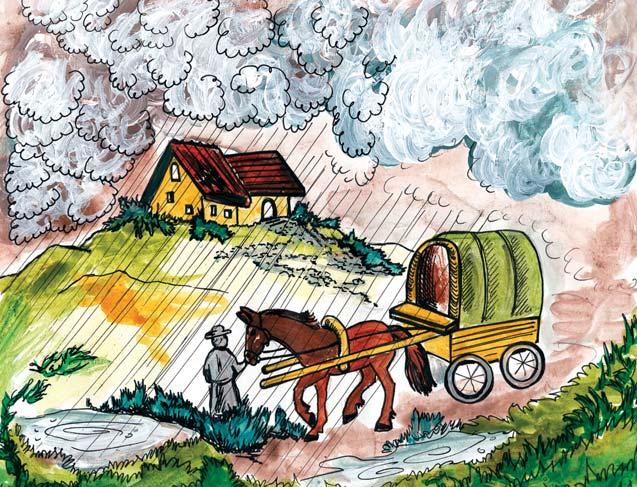
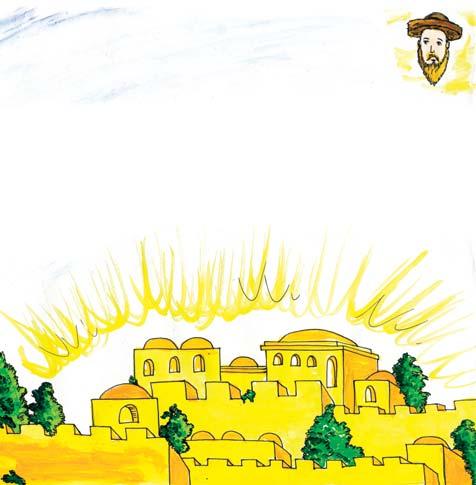

 BY DEVORAH SHINAN
BY DEVORAH SHINAN

THE HASIDIC MASTER KNOWN AS THE “SEER OF LUBLIN” PASSED AWAY, AND HIS WORLDLY POSSESSIONS WERE APPORTIONED. THE REBBE’S SILKEN SHABBAT GARMENTS, HIS BELT, AND THE CLOCK THAT ALWAYS HUNG ON HIS WALL PASSED TO HIS SON, REB YOSEF.
WHEN THE DOWNPOUR FINALLY STOPPED, THE VILLAGER REQUESTED PAYMENT.
REB YOSEF OPENED HIS SACK AND DISPLAYED HIS INHERITANCE, INVITING THE VILLAGER TO CHOOSE AN OBJECT. THE HOST ASKED HIS WIFE FOR ADVICE.


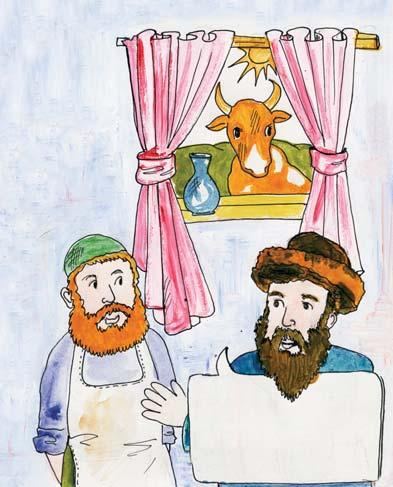
I HAVEN’T A COIN IN MY POCKET, BUT I DO HAVE SOME SACRED POSSESSIONS.
YEARS LATER, ANOTHER RIGHTEOUS MAN, REB YISSACHAR DOV, PASSED THROUGH THE VILLAGE. BECAUSE IT WAS LATE, HE SPENT THE NIGHT AT THE SAME HOUSE, IN THE SAME ROOM WHERE THE CLOCK HUNG. HE DID NOT SLEEP A WINK.
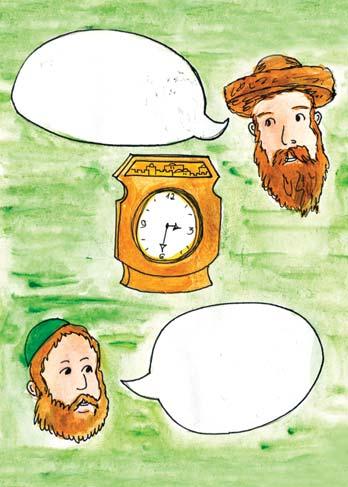

THE CLOTHES ARE OF NO USE TO US, NEITHER IS THE BELT. THE CLOCK, THOUGH, WILL TELL US WHAT TIME TO MILK THE COW.
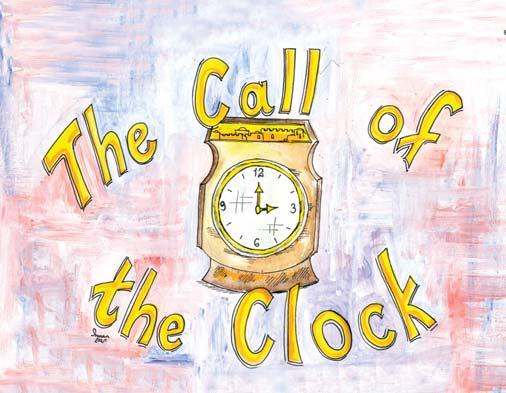

WHY DIDN’T YOU SLEEP? WHAT MADE YOU SO JOYFUL?
TELL ME, WHERE DOES THIS CLOCK COME FROM?
I GOT IT FROM A MAN AS PAYMENT, SINCE HE HAD NO MONEY.
WHAT IS HE DOING? WHY IS HE DANCING AND SINGING?
AS SOON AS I HEARD THIS CLOCK TICK, I COULD TELL THAT IT HAD BELONGED TO OUR MASTER, THE SEER OF LUBLIN. YOU SEE, EVERY CLOCK SOUNDS A MESSAGE TO ITS OWNER THAT HE IS ONE HOUR NEARER TO HIS DEATH; THE SOUND IS MELANCHOLY. THIS CLOCK IS DIFFERENT. IT TICKS AWAY EXULTANTLY, TELLING THOSE WHO LISTEN THAT WE ARE AN HOUR NEARER TO OUR REDEMPTION. SO, OF COURSE, I WAS SO HAPPY THAT I COULDN’T SLEEP, AND I DANCED INSTEAD!
By Guy Lieberman
The journey back home, you know, the one that begins with the first step, often begins by walking out the front door. Loaded with a backpack that would stagger the burliest Navy SEAL, I stumbled outside toward the car. My father was waiting at the driver’s side with a wide grin. He was to take me to the Johannesburg train station, destination: Bulawayo, Zimbabwe. “You must be crazy,” he said. “What do you need all that stuff for?” Perhaps he was right. After all, I was embarking on a spiritual journey—why all the baggage?
That glorious day was the first official step on my wide arc back home. Not back home to Jo’burg, but back home to my roots. It was November 1992. I was heading forth to conquer, running solo. I was going to find myself. Over the following nine years, I explored 35 countries throughout Africa, Europe, North and South America, the Middle East, South and Central Asia, and the Pacific Rim, coming into contact with a plethora of cultures and wisdom traditions, constantly seeking the unified vision, the spiritual apex, the ultimate understanding of why we are alive on earth. It was a blessed journey, and I have a library of multi-colored memories, along with a veritable U.N. of friends.
The spiritual high became my top priority, challenged only when distracted by European chocolate. I met mystics and meditators, shamans and charlatans, activists and criminals. And I was not alone. My spirituality-seeking brethren and I saw ourselves as cosmic corpuscles flowing through the veins of the living Earth, transferring energy as we traveled, sharing essential— and existential—information with one another, and leaving beacons that point the way to the nearest slab of Cadbury’s doublethick and other essentials. We knew our goals, and we were young and committed. But we had to keep moving.
In November of 1994, I arrived in Dharamsala, northern India, the home of the Dalai Lama and the Tibetan government-in-exile. And then everything changed. I felt I had discovered something very special, an ancient, carefully developed, and authentic wisdom tradition with many worthy teachers and, of course, the Dalai Lama himself at

their head. Not only that, the Tibetans were themselves a worthy cause, needing support in their struggle for freedom from the oppressive, brutal Chinese regime. I dove right in. Dharamsala starts in the plains and ascends up the foothills to the snowline of the Dhauladhar range of the Himalayas. It is a magical place: majestic snow-capped peaks, forests, meadows, and tiered barley fields set among picturesque villages of adobe and slate. Besides the familiar slew of spiritual seekers I recognized from the global vascular system, I noticed a marked increase in the Israeli population and a disproportionate number of Jews. In fact, I discovered this in most of the spiritual centers I visited across India, but nowhere was it so pronounced as in Dharamsala. According to the Department of Information at the Indian Embassy in Tel Aviv, 28,000 Israelis visit India every year, and nearly 20,000 of them head for Dharamsala. Jews, it seems, are great seekers.
My integration with the Tibetans was swift: I went into retreat, I studied, meditated, asked questions, I tried to be a good Buddhist boy. Along with others like myself, I would go into silence for days, sometimes weeks at a time. I soon discovered that there were many serious Jewish Buddhist practitioners who had ascended the ranks of the Tibetan Buddhist world. These and other Jews from an array of Buddhist sects across Asia are collectively known as JuBus. After all this time of denying any form of self-labeling, was I now going to be pigeonholed, no matter how accurately or—quite frankly—how cool?
There are stories, many of them, that tell of Jews who were intending to take on Buddhist practices, but when the Dalai Lama discovered their intentions, he explicit-
The Road To Return
18| ~.org
ly discouraged them from so doing. His general attitude is this: If one were to seek spirituality at home with the same sincerity, breadth, acceptance, and commitment, one would certainly find what one was looking for. We are born as Jews for a reason: to be as Jewish as we can.
Azriel Cohen, who runs an organization that hosts large Passover seders and programs around the Jewish holidays in Dharamsala, initially led a small delegation to meet with the Dalai Lama. He respectfully requested the Dalai Lama’s permission to run Jewish-focused religious festivals in what is ostensibly the Tibetan leader’s seat-in-exile. The Dalai Lama’s response was full of laughter, but telling: “Permission? It is my pleasure! You are the Chosen People, not so?”
In 1999, I reached a crossroad. I was a director of the World Festival of Sacred Music, the Dalai Lama’s millennium initiative. Each continent was to host such a festival, and it was my responsibility to see that the African event took place in Cape Town that December. It was a gargantuan undertaking that brought me back home to South Africa. While I attempted to make it all dovetail, I began to explore Jewish teachings and was a frequent guest at local Shabbat tables. I began learning basic Kabbalah under the guidance of Rabbi Dr. Arthur Seltzer, a Lubavitcher from New York. He had a deeply positive effect on me, and together we navigated this transformational period of my life. There was no longer any doubt that I was moving closer to Judaism. The depth of the spirituality and the personal and communal commitment fascinated me. I was compelled to know more.
Rodger Kamenetz, author of the well-known book The Jew in theLotus:APoet’sRediscoveryofJewishIdentityinBuddhist India, documents a meeting of the Dalai Lama and eight rabbis. Kamenetz and I once shared some thoughts on the present state of the Jewish world and the fact that so many Jews are disconnected from our tradition. What the Buddhists have done, he said, is create a Buddhism for export from which Westerners benefit. What we need to do, he continued, is to create a Judaism for export—and then import it back to ourselves.
About halfway through ’99, with a profound sense of the changes that lay ahead and a commitment to move with dedication and patience, I decided that I would head for Jerusalem. This empowering resolution altered my experience in every pos-
sible way. In January 2000, I packed my Cape Town life into boxes and embarked for Israel.
My first port of call was the Mayanot Yeshivah, which proved to be a good entry point into Jerusalem and Judaism. The young men living and learning there, warmly called bochurim (boys), came from socio-economic backgrounds similar to mine. There was a range of ages and degrees of Jewish exposure, from successfully secular to newly religious and everything in between. I spent seven weeks there and, thanks to the open attitude of the rabbis, was able to come and go as I pleased.
It was during that time that I discovered Safed, the ancient city that is the heart of Jewish mysticism. Close friends encouraged me to head up there for a visit and get a taste of Kabbalah in 3-D. I was intrigued and soon discovered that an old highschool friend and his wife were, in fact, living there, running programs for an organization called Livnot U’Lehibanot (“To Build and To Be Built”). They invited me for Shabbat, and I accepted.
From the moment I tasted that Shabbat in Safed, my life took a sharp turn. I will simply say that without rebuffing any of my former choices—all choices are ultimately Providential—I happened upon the most fitting home for me. So I stayed, and through a remarkable range of escapades, here I have remained. The ancient city accepted me, flaws and all. I met teachers and sage mentors, developed deep friendships, and discovered my wife, Tiferet, here. We have made a life for ourselves in the Artist Quarter, where she illustrates children’s books and I produce documentary films on spiritual and cultural topics, focusing on Jewish issues and life in Israel. It is no overstatement to say that we live a blessed life. I have returned, awed by the gifts that lie hidden within my true home.
GuyLiebermanproducesdocumentariesonspiritual,cultural,andhealthy livingtopics.Hecanbereachedatwww.guylieberman.com.

~ Kosher| 19
According to the Department of Information at the Indian Embassy inTel Aviv, 28,000 Israelis visit India every year, and nearly 20,000 of them head for Dharamsala. Jews, it seems, are great seekers.

© 2004 Tropicana Products, Inc. Helpkeepyourheartrunningstrong: New Tropicana® Healthy Heart.TM The powerofsix heart healthy nutrientsand zero sodium. The power to be strong to the core, THAT’S THE POWEROFPURE PREMIUM. ® ~




 MichaelR.BloombergistheMayorofNewYorkCity.
MichaelR.BloombergistheMayorofNewYorkCity.



















 BY DEVORAH SHINAN
BY DEVORAH SHINAN










